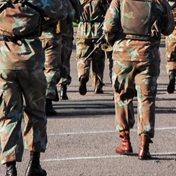
South Africans at the bottom of the economic pyramid would have been the ones most negatively affected by Friday’s planned banking sector strike, because these are the people who depend highly on cash.
Speaking to City Press on Thursday, following Judge Hilary Rabkin-Naicker’s ruling that the planned banking strike by the South African Society of Bank Officials (Sasbo) could not go ahead tomorrow, Nedlac convener for Business Unity South Africa, Kaizer Moyane, said: “Any form of industrial action, will have a negative impact on the economy.”
He added: “In this particular case, if you target the finance sector, the impact of the damage will be multiplied because a lot of small businesses that rely on the finance sector to facilitate movement of money on a daily business, there are a lot of people in small towns and rural areas who rely on cash to facilitate their transactions. So those are the people who would have been impacted the most.”
According to senior economics lecturer at Wits University, Lumkile Mondi, the now-cancelled strike could have been “highly disruptive and costly, not just to workers of the financial sector but to employees of all other sectors because of the role finance plays in the economy”.
Mondi said that the financial sector played a critical role in mobilising savings and applying them into investment.
“The strike could impact circular flow of goods and services as well as the investment process. It could cause damage to the other sectors in the economy,” Mondi added.
Following Sasbo’s – an affiliate of trade union federation Cosatu – plan to hold marches across major cities to protest against retrenchments in the banking sector, Busa launched an urgent court application to interdict the strike.
Read: Banks forced us into action - banking officials
To the union’s dismay, on Thursday, Rabin-Naicker ruled that Cosatu and Sasbo had failed to comply with provisions in section 77 of the labour relations act.
As stated in the act, section 77 gives workers the right to take part in protest action to “promote or defend their socioeconomic interest” and be protected against dismissal and other disciplinary action.
It gives Nedlac – the National Economic Development and Labour Council – as a policy-making body made up of government, business, labour and the community, the task of bringing the parties together to attempt to resolve the reasons for the protest action.
Disheartened Sasbo secretary-general Joe Kokela said as a union they had no option but to respect the court’s ruling.
“The court interdict was granted, meaning what Busa were asking for was granted to them. So essentially we have to call off the protest action, which we have done, he told City Press.
Although Kokela said the union was left aghast by Thursday’s ruling, he emphasised that this was not the end because they put wheels of action in motion before leaving the Johannesburg Labour Court.
“As we were leaving the courthouse we instructed our lawyers to make sure that they put in an urgent appeal and we have also now started with the other process of making sure that we are going to resubmit documents to the National Economic Development and Labour Council,” he said.
For Kokela it did not make sense how protest action “that is protecting jobs of South Africans who contribute to the economy” could negatively affect said economy.
“Workers should not be affected negatively because here we are saying, how we save their jobs. How can that be a negative thing?” he said.
“This court judgment today was clearly indicating that what the employers are doing to workers is correct and that they should go ahead and retrench people. In fact this court judgment has failed the workers in this country.”
Kokela added: “Saying the strike would have a negative impact on the economy is not true because if we are fighting for people to retain their jobs, people who also form part of the economy, who contribute to the economy, how can that be true?” he asked again.
“If you have plus minus 18 million to 20 million people who are out of jobs, how are you going to activate and boost the economy?”
Moyane, said the judgment interdicting the protest action was a bitter sweet moment.
“Today’s judgment was a victory, but it is a victory we are not necessarily celebrating because we are saying that there are underlying issues that have caused Cosatu to want to go on protest action and Sasbo to want to support that protest action,” he said.
“All Busa wanted was an opportunity to discuss what their problems are and Nedlac is the platform for that. So we are happy that the judge has reaffirmed the importance of section 77 in that it emphasises the dialogue that must precede any form of protest action.”
“Cosatu must do the right thing,” Moyane said.
“Section 77 says if you have concerns that may lead to protest action ... you need to send them to Nedlac and the other parties will be invited to address those concerns. Cosatu knows what they have to do.”
The Banking Association South Africa (Basa) said on Thursday that it recognised the rights of bank workers to engage in protest action.
“These actions need to be undertaken in terms of the law, to ensure the safety of the public, businesses and their customers, as well as the least possible disruption of the economy.”
According to Basa “the court accepted the view that Cosatu’s notice to the (Nedlac) of a planned protest, under which Sasbo was going to act, has expired. The Nedlac notice had first been issued in August 2017 – and could not be relied upon.”
The association ensured the usual operation of banks on Friday, September 27 – the day of the planned action.
However bank customers were urged to make use of digital banking services on the day, citing the need to avoid any unplanned or illegal disruptions of branches.
 |
| ||||||||||||
| |||||||||||||




 Publications
Publications
 Partners
Partners









